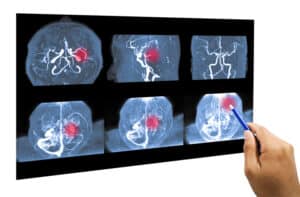
Problems occur if an aneurysm grows and begins pressing on the brain or nerves stemming out of the brain, or if the aneurysm ruptures. Both of these instances are life threatening and would require immediate intervention by our three neurosurgeons at Texas Neurosurgery.
What causes an aneurysm?
It’s not clear why one person develops an aneurysm, and another doesn’t. Some aneurysms are congenital and present at birth. Others may result from a slight defect in part of the arterial wall. There are certain risk factors that seem to increase a person’s odds of developing and aneurysm:
- Poor elasticity of arterial walls
- Plaque buildup on arterial walls
- High blood pressure
- High cholesterol
- Cigarette smoking
- Pregnancy
- Blood infections
- Cocaine use
- Heavy alcohol consumption
Surgery for ruptured aneurysm
When a brain aneurysm ruptures, this is an emergency situation. There are two common surgical options for these emergencies.
- Surgical clipping — This procedure closes off the aneurysm. Our neurosurgeons remove a section of the patient’s skull to access the aneurysm and locate the blood vessel that is feeding the aneurysm. We then place a tiny metal clip on the neck of the aneurysm to stop the blood flow to it.
- Endovascular coiling — This is a less invasive method. We insert a catheter into the artery in the groin and thread it up the artery toward the brain. A guide wire is then used to push a soft platinum wire through the catheter and into the aneurysm. The wire coils up inside the aneurysm, disrupts blood flow and essentially seals off the aneurysm from the artery.
If you have any symptoms of an aneurysm, such as a localized headache, dilated pupils, pain behind an eye, or double vision, we should see you immediately at Texas Neurosurgery. Call us at (214) 823-2052 to schedule an appointment.

